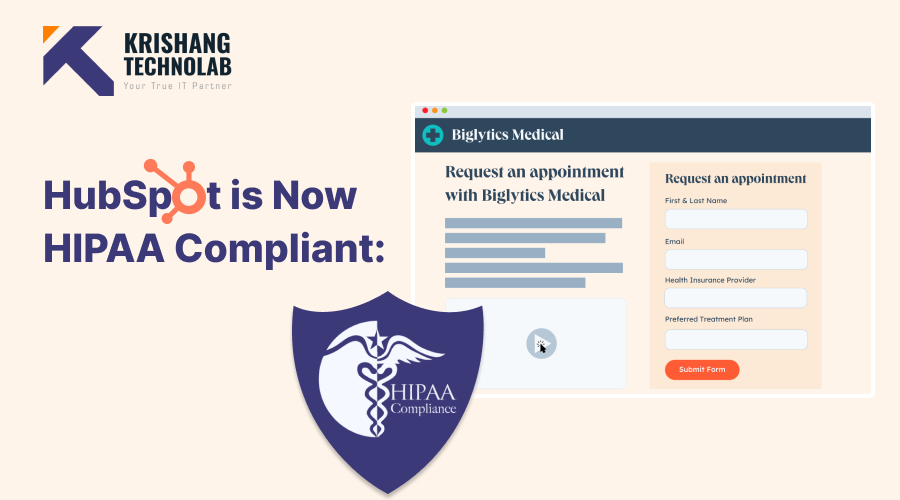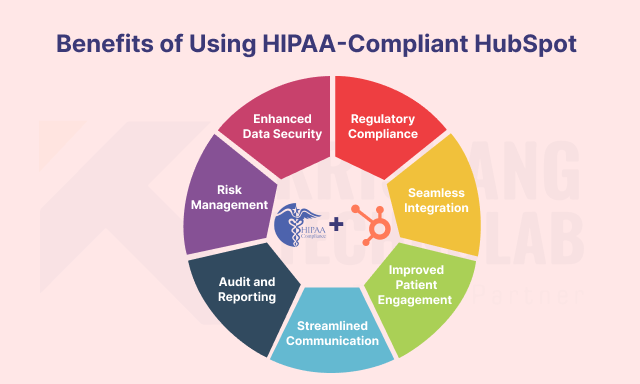
The path HubSpot took to become HIPAA compliant and the implications for companies. We’ll go over the fundamentals of HIPAA, talk about the difficulties HubSpot encountered, and explore the new solutions they released to comply with regulatory standards.
Violating HIPAA can result in penalties, so many healthcare companies are careful to follow the strict guidelines outlined by the U.S. Department of Healthcare and Human Services’ Office for Civil Rights (OCR).
Businesses who were previously unable to use HubSpot because of HIPAA restrictions may now securely and successfully utilise its intelligent CRM, sales, and marketing tools by being aware of these changes.
Though utilizing cutting-edge software gives them a competitive advantage in the market, most healthcare organizations still have worries about keeping and sharing information from inside their digital platforms.
What is HIPAA ?
In order to prevent the disclosure of private patient healthcare information without the informed permission of the patient, the United States passed the Health Insurance Portability and Accountability Act (HIPAA) in 1996.
HIPAA establishes the benchmark for sensitive data protection, guaranteeing that people’s medical records are appropriately protected while permitting the exchange of medical records required to deliver high-quality healthcare.
From a CRM standpoint, this implies that in order to guarantee compliance, every CRM system used by healthcare organizations needs to abide by stringent security and privacy regulations. This covers audit logs, encryption, access limits, and safe data storage. CRMs can assist healthcare providers in effectively managing their data while upholding patient confidence by fulfilling these needs.
Importance of HIPAA compliance
Compliance with HIPAA is essential for any healthcare company that handles patient data. Patient privacy and trust are preserved via compliance, which guarantees that patient data is shielded against unauthorized access, breaches, and abuse.
Respecting HIPAA standards is not just a legal thing for healthcare providers, Health insurance companies, Telehealth services and other health agencies that handle health information; it is also an essential part of their duty to their patients. Serious civil and criminal fines may arise from noncompliance with HIPAA regulations.
Scenarios Where required a HIPAA-compliant CRM in Healthcare Industry
Healthcare providers
Securing patient communications, appointment scheduling, and patient records are all important tasks for medical practices. By avoiding unauthorised access to private health information, using a CRM that conforms with HIPAA standards guarantees that all patient contacts and data are safeguarded in accordance with legal requirements.
Health insurance firms
Insurance companies are in charge of managing a significant quantity of private patient data, such as billing records, medical histories, and claims data. To handle this data safely and make sure that it is handled and maintained in accordance with HIPAA standards, a CRM that conforms with the regulations is required.
Telehealth services
A telehealth provider gives medical advice and treatments from a distance. To manage patient data, appointment scheduling, and follow-ups, they require a CRM. By making sure their CRM complies with HIPAA, the provider can uphold confidentiality and trust while protecting patient data exchanged during virtual consultations.
Health and Wellness Programs
Health and wellness program managers can use HubSpot to organize and track participant progress. Automated communication keeps participants engaged and informed about their progress.
Home Healthcare Services
The customer receives treatment from home health care providers in their own residence. Professional home health treatments might involve physical therapy, occupational therapy, speech therapy, wound care, pain management, medical or psychological evaluation, and illness education and management.
Benefits of Using HubSpot HIPAA-Compliant
In the fast-paced world of healthcare, data security and regulatory compliance are top priorities. That’s why more and more healthcare organizations are turning to HIPAA-compliant HubSpot for their marketing and communication needs. What advantages does this platform provide specifically?

Enhanced Data Security
With HIPAA-compliant HubSpot, you can rest assured that your sensitive patient data is safe and secure. The platform follows strict security protocols to protect against unauthorized access, ensuring that your patient information remains confidential.
Regulatory Compliance
HIPAA regulations are complex and ever-changing, but with HubSpot, you can stay compliant with ease. The platform is designed to meet the stringent requirements of HIPAA, helping you avoid costly fines and penalties.
Streamlined Communication
Effective communication is essential in healthcare, and HubSpot makes it easy to reach your patients with targeted messaging. From email campaigns to social media posts, you can engage with your audience in a personalized and efficient manner.
Improved Patient Engagement
By using HIPAA-compliant HubSpot, you can enhance patient engagement and build stronger relationships with your patients. The platform allows you to track patient interactions and tailor your communications to their specific needs, leading to better outcomes and increased satisfaction.
Seamless Integration
HubSpot integrates seamlessly with a variety of healthcare systems, allowing you to streamline your workflows and improve efficiency. Whether you’re managing appointments, tracking leads, or analyzing data, HubSpot has you covered.
Audit and Reporting
Tracking your marketing efforts and analyzing performance is crucial for success in healthcare. With HubSpot, you can easily generate reports and track key metrics, giving you valuable insights into your marketing campaigns and helping you make data-driven decisions.
Risk Management
In the world of healthcare, managing risk is essential. With HIPAA-compliant HubSpot Development, you can mitigate potential risks and ensure compliance with industry regulations. The platform’s robust security features and compliance tools help you protect your organization from potential threats and vulnerabilities.

What kind of Challenges faced by businesses who want to use HubSpot CRM ?
Here’s some Restrictions for organizations who managing sensitive patient data, such as healthcare providers, home insurance company.
Complicated workarounds
Complicated and sometimes expensive workarounds were required for individuals who wished to continue utilising HubSpot’s potent CRM, sales, and marketing tools. Creating a system that could handle sensitive data in accordance with HIPAA regulations required developing unique integrations and solutions. The complexity of system administration and maintenance was raised by these solutions, which were also quite costly.
Operational inefficiencies
These special workarounds’ implementation resulted in inefficiencies inside the operations. The development and upkeep of these bespoke it solutions required more IT HubSpot Dedicated Developers, which took time and money away from essential HubSpot Development Company operations. Furthermore, there was always the possibility of non-compliance because of the piecemeal nature of these solutions.
Risk of non-compliance
The intrinsic risk of non-compliance persisted to be substantial, even in the face of attempts to develop compliant solutions. Any security gap or misconfiguration might result in PHI breaches, which could have serious negative effects on the organization’s reputation in addition to financial and legal ramifications.
HubSpot’s latest HIPAA compliance tools
HubSpot has launched a new set of solutions aimed at achieving HIPAA compliance in response to the increasing demand from healthcare organizations and other Healthcare Software companies who managing sensitive patient data. Thanks to these improvements, companies may now take use of HubSpot CRM, sales, and marketing capabilities while maintaining patient privacy and security.
The latest HIPAA-compliant products and tools from HubSpot include below features:
Enhanced encryption of data
HubSpot has put sophisticated encryption measures into place to safeguard data while it’s in transit and at rest. This satisfies HIPAA’s strict criteria for data protection by guaranteeing that PHI is encrypted and safe.
Secure access controls
HubSpot now has strong access controls in order to meet the requirement for tight access management. With role-based access settings and multi-factor authentication added for added data security, these restrictions guarantee that only authorised people may access critical information.
Audit log and monitoring
HubSpot has included extensive features for audit logging and monitoring. With the use of these technologies, Software development Company can monitor who has access to and changes to PHI, giving them a transparent audit trail that is crucial for security and compliance.
Business associate agreement (BAA)
HubSpot is now providing covered companies with a Business Associate Agreement (BAA). This contract, which outlines HubSpot’s obligations as a business associate in protecting PHI, is essential to HIPAA compliance.
Safe data storage options
HubSpot has improved its HIPAA-compliant data storage options. These include safe, HIPAA-compliant data centres and servers that have strict digital and physical security protocols in place.
Conclusion
In conclusion, HIPAA compliance is crucial for healthcare businesses, and HubSpot’s recent compliance update makes it the ideal solution for businesses in this industry. With its comprehensive tools and features, HubSpot not only ensures data security and compliance but also empowers businesses to operate more efficiently. Don’t risk your business’s reputation and patient trust; switch to HubSpot for improved security and compliance.